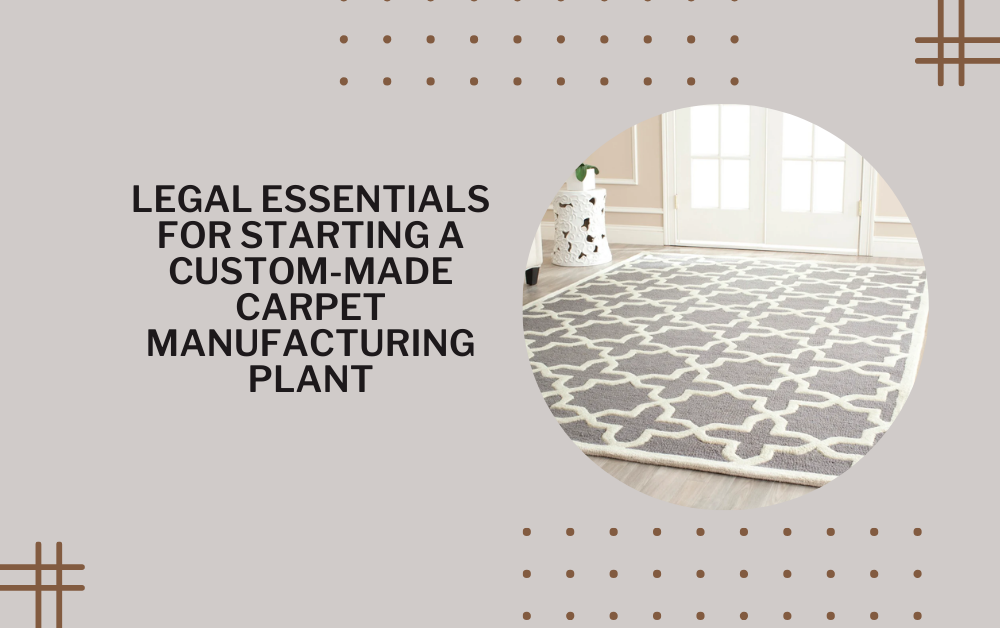Legal Essentials for Starting a Custom-Made Carpet Manufacturing Plant
Introduction
Starting a custom-made carpet manufacturing plant is an exciting venture that promises creativity, innovation, and significant market potential. However, this journey is fraught with legal requirements that must be meticulously addressed to ensure smooth operations and long-term success. From obtaining the necessary permits to complying with environmental regulations, understanding the legal landscape is crucial for any aspiring carpet manufacturer. This article aims to demystify the legalities involved in setting up a custom carpet manufacturing plant, providing a step-by-step guide to help you navigate this complex process and avoid potential pitfalls.
Understanding Local Zoning Laws
One of the first steps in establishing a custom-made carpet manufacturing plant is understanding and complying with local zoning laws. These laws dictate where you can set up your manufacturing facility and what kind of activities you can conduct there.
Researching Zoning Regulations
Zoning regulations vary significantly from one area to another. It’s essential to research the specific zoning laws in the area where you plan to establish your plant. Local government websites and planning departments can provide detailed information about zoning requirements. You may need to obtain a zoning permit or approval from the local zoning board before you can proceed.
Applying for Zoning Variances
If the area you have chosen is not zoned for manufacturing, you may need to apply for a zoning variance. This process involves submitting a detailed application and possibly attending public hearings to justify why your manufacturing plant should be allowed in a non-industrial zone. Be prepared to demonstrate how your plant will benefit the community and address any concerns about noise, traffic, or environmental impact.
Securing Permits and Licenses
Starting a custom carpet manufacturing plant requires various permits and licenses to operate legally. These permits ensure that your business complies with local, state, and federal regulations.
Business License
A business license is a basic requirement for operating any business. This license allows you to legally conduct business in your chosen location. The process for obtaining a business license typically involves filling out an application, paying a fee, and possibly undergoing a background check.
Manufacturing Permit
A manufacturing permit specifically allows Custom made carpet manufacturer in UAE to produce goods, in this case, custom-made carpets. This permit ensures that your manufacturing processes meet safety and quality standards set by regulatory authorities. The application process may involve detailed descriptions of your manufacturing processes, equipment, and safety protocols.
Environmental Permits
Manufacturing plants often have significant environmental impacts, so obtaining the necessary environmental permits is crucial. These permits ensure that your plant complies with regulations related to air quality, water usage, waste management, and pollution control. You may need to conduct environmental impact assessments and submit detailed plans on how you will minimize and manage environmental risks.
Ensuring Workplace Safety Compliance
Workplace safety is a critical concern in any manufacturing setting. Ensuring that your custom carpet manufacturing plant complies with workplace safety regulations is not only a legal requirement but also essential for protecting your employees.
Occupational Safety and Health Administration (OSHA) Compliance
In the United States, OSHA sets and enforces standards to ensure safe and healthy working conditions. Compliance with OSHA regulations involves implementing safety protocols, providing employee training, and regularly inspecting equipment and facilities. You must also keep detailed records of workplace injuries and illnesses and report them to OSHA as required.
Fire Safety Regulations
Manufacturing plants must comply with fire safety regulations to protect employees and property. This includes installing and maintaining fire detection and suppression systems, conducting regular fire drills, and ensuring that fire exits are clearly marked and accessible. Your local fire department can provide guidance on specific fire safety requirements for your plant.
Employee Training and Safety Programs
Providing regular training on safety procedures and emergency response is essential for maintaining a safe workplace. Develop comprehensive safety programs that cover all aspects of your manufacturing processes, and ensure that all employees are trained and equipped to handle potential hazards.
Protecting Intellectual Property
In the custom carpet manufacturing industry, protecting your unique designs and manufacturing processes is vital for maintaining a competitive edge. Intellectual property (IP) laws provide the legal framework to safeguard your innovations.
Trademarks
Registering a trademark for your brand name, logo, and unique carpet designs helps protect your brand identity and prevents others from using similar marks. Trademarks can be registered at the national level with the United States Patent and Trademark Office (USPTO) or equivalent agencies in other countries.
Patents
If your custom carpet manufacturing process involves innovative techniques or machinery, you may be able to obtain a patent. A patent gives you exclusive rights to use and license your invention for a certain period, typically 20 years. The patent application process can be complex and requires detailed documentation of your invention.
Copyrights
Copyrights protect original works of art, including carpet designs. Registering your designs with the U.S. Copyright Office or equivalent agencies in other countries ensures that you have legal recourse if someone copies your designs without permission.
Navigating Employment Laws
Hiring and managing employees involves complying with various employment laws designed to protect workers’ rights and ensure fair treatment.
Fair Labor Standards Act (FLSA)
The FLSA sets standards for minimum wage, overtime pay, record keeping, and child labor. Ensure that your hiring practices, wage policies, and working hours comply with FLSA regulations. Keeping accurate records of employees’ working hours and wages is also essential for compliance.
Equal Employment Opportunity (EEO) Laws
EEO laws prohibit discrimination in employment based on race, color, religion, sex, national origin, age, disability, or genetic information. Develop and implement hiring practices that promote diversity and prevent discrimination. Providing regular training on EEO policies can help create an inclusive workplace culture.
Workers’ Compensation
Workers’ compensation laws require employers to provide benefits to employees who suffer work-related injuries or illnesses. This includes medical care, rehabilitation, and compensation for lost wages. Ensure that you have a workers’ compensation insurance policy in place and that you comply with state-specific requirements.
Complying with Tax Regulations
Tax compliance is a critical aspect of running a successful manufacturing business. Understanding and adhering to tax regulations ensures that your business operates legally and avoids costly penalties.
Federal and State Taxes
Custom carpet manufacturers must comply with federal and state tax regulations. This includes paying income taxes, employment taxes, and possibly sales taxes. Consult with a tax professional to ensure that you understand your tax obligations and take advantage of any available deductions or credits.
Property Taxes
If you own the property where your manufacturing plant is located, you will need to pay property taxes. These taxes are based on the assessed value of the property and are typically paid to the local government. Ensure that you budget for property taxes and stay current with payments to avoid penalties.
Import and Export Taxes
If you plan to import raw materials or export finished products, you will need to comply with import and export tax regulations. This includes paying customs duties and complying with trade regulations. Working with a customs broker can help simplify this process and ensure compliance.
Conclusion
Starting a custom-made carpet manufacturing plant involves navigating a complex web of legal requirements. From understanding local zoning laws and securing necessary permits to ensuring workplace safety and protecting intellectual property, each step is crucial for establishing a compliant and successful business. By thoroughly researching and adhering to these legalities, you can build a strong foundation for your manufacturing plant, minimize risks, and focus on creating high-quality custom carpets that stand out in the market. This comprehensive guide aims to equip you with the knowledge and tools needed to embark on this exciting venture with confidence, ensuring that your business is both legally compliant and poised for success.
Note :- To Read More Articles Visit on- allguestblog






